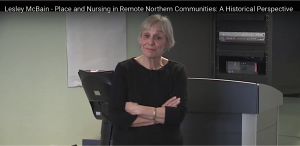PLACE AND NURSING IN REMOTE NORTHERN COMMUNITIES: A HISTORICAL PERSPECTIVE
This lecture was delivered by Dr Lesley McBain, PhD for the March 2015 Health HIstory Lecture, Consortium for Nursing History Inquiry, Nursing at UBC.
Summary: Following World War II, provincial governments began extending healthcare to residents living in northern remote communities in Canada as a way to “modernize” the vast region and to pave the way for increased resource extraction. Small outpost nursing stations were established as part of a public health program across the north where public health nurses, often working alone and facing a number of challenges, delivered health care services to the primarily Aboriginal population. Lesley McBain introduced four perspectives as a way to understand and place in context the nurses’ experiences and interaction with northern communities. These included: the geographical notions of place and region; nursing notions of distal nursing – a framework offered by Ruth Malone – that explains the way nursing practice and interaction with users of service is dependent upon relational proximity that might get interrupted or be constrained by larger spatial-structural influences, such as – in this case – the federal – provincial division of health care delivery; the notion of modernization; and lastly, perspectives of colonization and internal colonization, which in this case referred to the way the North was viewed as a colony of the south from an intraprovincial point of view. These influences on nurses’ work and interaction with the local communities meant that the nurses’ roles and their perceptions of the communities where they worked were often ambiguous and contradictory, resulting in a mixed experience for nurses and patients alike. Drawing from the nurses’ personal correspondence and interviews, Lesley McBain gave insightful examples of nurses’ interactions and experiences, illustrating the perspectives about the places where nurses worked and the people they provided services to during a time of significant change.
For further details please refer to the recording of the talk, which has been made available by UBC IK Barber Learning Centre’s Community Outreach Program – Accessible Here.
Dr. Lesley McBain is Associate Professor Department of Indigenous Languages, Arts, and Cultures (DILAC), First Nations University of Canada. She received her doctorate degree in Geography from the University of Saskatchewan and has a Masters and Bachelors degree in Geography from the University of Saskatchewan.She is the Consortium’s 2015 Visiting Associate Professor.
If you want to read more about Lesley McBain’s research on the history of nursing in northern communities, see: McBain (2012) “Pulling Up Their Sleeves and Getting on with It: Providing Health Care in a Northern Remote Region,” Canadian Bulletin of Medical History, 29 (2), 309-328. This article is available on line through open access at: http://www.cbmh.ca/index.php/cbmh/article/view/1513
The UBC School of Nursing Consortium for Nursing History Inquiry Lecture Series is collaboration with the UBC Library and IK Barber Centre.


 Follow
Follow